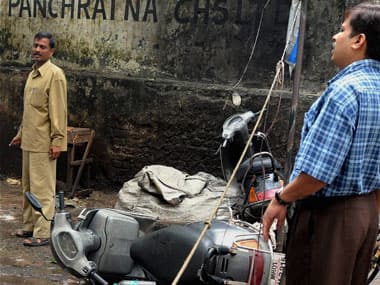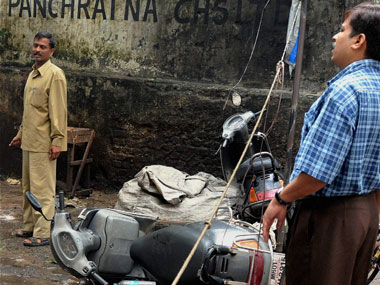The way our various anti-terrorism agencies work – often at cross-purposes, and fighting territorial wars - would be laughably funny if it were not so deadly serious. Yesterday, the head of the Maharashtra Anti-Terror Squad announced in Mumbai, to much fanfare and media flourish, that its ace team had
cracked the July 2011 bombings in Mumbai
, with the arrest of two persons - Naqi Ahmed, 22, and Nadeem Akhtar, 23, from Darbhanga in Bihar. The ATS said it was also seeking custody of a third accused, Haroon Rashid Naik, who had earlier been arrested in a counterfeit currency case and may throw light on the conspiracy behind the attacks on 13 July last year, in which some 27 people died and over 130 were injured. [caption id=“attachment_93085” align=“alignright” width=“380” caption=“The turf war among anti-terrorism agencies is deeply disquieting. PTI”]
 [/caption] Mumbai ATS chief Rakesh Maria offered merciless details of the investigations, which took the ATS team to 18 states, led them to interrogate over 12,000 witnesses and review 180 hour of CCTV footage of the blasts. And although the main accused in the case, Yasin Bhatkal, who is allegedly associated with the Indian Mujahideen terror group, was still on the run, Marai claimed “success” in the investigations insofar as they had “pinpointed the perpetrators” of the bomb attacks. But barely hours after Maria had finished preening in front of cameras, central intelligence and Delhi Police officials were rubbishing the claims – and saying that in fact the
ATS had got the wrong man
. How were they so sure? Because, they say, one of the arrested men – Naqi Ahmed – is in fact a Delhi Police informer who was to lead them to the masterminds behind the attack, including two Pakistani nationals. And, they further claim, the premature revelation of the facts of the case by the ATS on Monday had “botched up”” the investigationsby alerting the masterminds, who had fled. At his Mumbai press conference, Maria responded tangentially to earlier media reports that had claimed that Naqi Ahmed was in fact an innocent informer. He claimed that far from being innocent, Naqi Ahmed knew of Bhatkal’s terrorist links, and that Bhatkal had visited him in Darbhanga and conducted jihadi indoctrination programmes to draw young boys into terror attacks. From all accounts, it appears that the Mumbai ATS, the Delhi Police special cell and the central Intelligence Bureau are all caught up in a “turf war” - which is now beginning to impair the investigations into one of the most recent incidents of terror attacks.
The Telegraph reports
, citing a “top security officer’ that all this was “nothing but a turf war between the Maharashtra ATS and the Delhi Police special cell.” A Delhi police officer said: “They (the Maharashtra ATS) felt bad when Delhi police solved the Pune bakery blast case last year. Now it will be difficult for them to prove Naqi’s involvement.” It’s a pretty damning comment on the effectiveness of our anti-terrorism operations If our premier intelligence agencies and anti-terrorism squads cannot work together even on the investigations into terrorist attacks, and will not flinch from petty turf wars even in a case such as this. Nor is this the only instance of utter lack of professionalism among the various security agencies. Just the other day, it was revealed that the Rajasthan intelligence officials had
concocted a cock-and-bull story
about assassination squads coming to Jaipur to bump off writer Salman Rushdie, who was to have attended the Jaipur Literature Festival. Rushdie had become something of a hot potato for the Congress, given that Muslim groups, incensed by his book The Satanic Verses, were campaigning to prevent him from coming to India. By making up a fictitious assassination threat, which had the effect of forcing Rushdie to call off his visit, the Congress effectively secured the Muslim groups’ desired end – a non-appearance by Rushdie – without actually doing anything to prevent him from coming. But the wilful resort to deceit on security issues, for political ends, is another sign of the erosion in the professionalism of security agencies. Nothing, not even the security of our people, is sacred, is appears. Anything is fair game for petty turf wars among our anti-terrorism forces and intelligence agencies. What does it matter that the masterminds behind terror attacks have slipped the net. Don’t you feel safer already?
[/caption] Mumbai ATS chief Rakesh Maria offered merciless details of the investigations, which took the ATS team to 18 states, led them to interrogate over 12,000 witnesses and review 180 hour of CCTV footage of the blasts. And although the main accused in the case, Yasin Bhatkal, who is allegedly associated with the Indian Mujahideen terror group, was still on the run, Marai claimed “success” in the investigations insofar as they had “pinpointed the perpetrators” of the bomb attacks. But barely hours after Maria had finished preening in front of cameras, central intelligence and Delhi Police officials were rubbishing the claims – and saying that in fact the
ATS had got the wrong man
. How were they so sure? Because, they say, one of the arrested men – Naqi Ahmed – is in fact a Delhi Police informer who was to lead them to the masterminds behind the attack, including two Pakistani nationals. And, they further claim, the premature revelation of the facts of the case by the ATS on Monday had “botched up”” the investigationsby alerting the masterminds, who had fled. At his Mumbai press conference, Maria responded tangentially to earlier media reports that had claimed that Naqi Ahmed was in fact an innocent informer. He claimed that far from being innocent, Naqi Ahmed knew of Bhatkal’s terrorist links, and that Bhatkal had visited him in Darbhanga and conducted jihadi indoctrination programmes to draw young boys into terror attacks. From all accounts, it appears that the Mumbai ATS, the Delhi Police special cell and the central Intelligence Bureau are all caught up in a “turf war” - which is now beginning to impair the investigations into one of the most recent incidents of terror attacks.
The Telegraph reports
, citing a “top security officer’ that all this was “nothing but a turf war between the Maharashtra ATS and the Delhi Police special cell.” A Delhi police officer said: “They (the Maharashtra ATS) felt bad when Delhi police solved the Pune bakery blast case last year. Now it will be difficult for them to prove Naqi’s involvement.” It’s a pretty damning comment on the effectiveness of our anti-terrorism operations If our premier intelligence agencies and anti-terrorism squads cannot work together even on the investigations into terrorist attacks, and will not flinch from petty turf wars even in a case such as this. Nor is this the only instance of utter lack of professionalism among the various security agencies. Just the other day, it was revealed that the Rajasthan intelligence officials had
concocted a cock-and-bull story
about assassination squads coming to Jaipur to bump off writer Salman Rushdie, who was to have attended the Jaipur Literature Festival. Rushdie had become something of a hot potato for the Congress, given that Muslim groups, incensed by his book The Satanic Verses, were campaigning to prevent him from coming to India. By making up a fictitious assassination threat, which had the effect of forcing Rushdie to call off his visit, the Congress effectively secured the Muslim groups’ desired end – a non-appearance by Rushdie – without actually doing anything to prevent him from coming. But the wilful resort to deceit on security issues, for political ends, is another sign of the erosion in the professionalism of security agencies. Nothing, not even the security of our people, is sacred, is appears. Anything is fair game for petty turf wars among our anti-terrorism forces and intelligence agencies. What does it matter that the masterminds behind terror attacks have slipped the net. Don’t you feel safer already?
Venky Vembu attained his first Fifteen Minutes of Fame in 1984, on the threshold of his career, when paparazzi pictures of him with Maneka Gandhi were splashed in the world media under the mischievous tag ‘International Affairs’. But that’s a story he’s saving up for his memoirs… Over 25 years, Venky worked in The Indian Express, Frontline newsmagazine, Outlook Money and DNA, before joining FirstPost ahead of its launch. Additionally, he has been published, at various times, in, among other publications, The Times of India, Hindustan Times, Outlook, and Outlook Traveller.
)